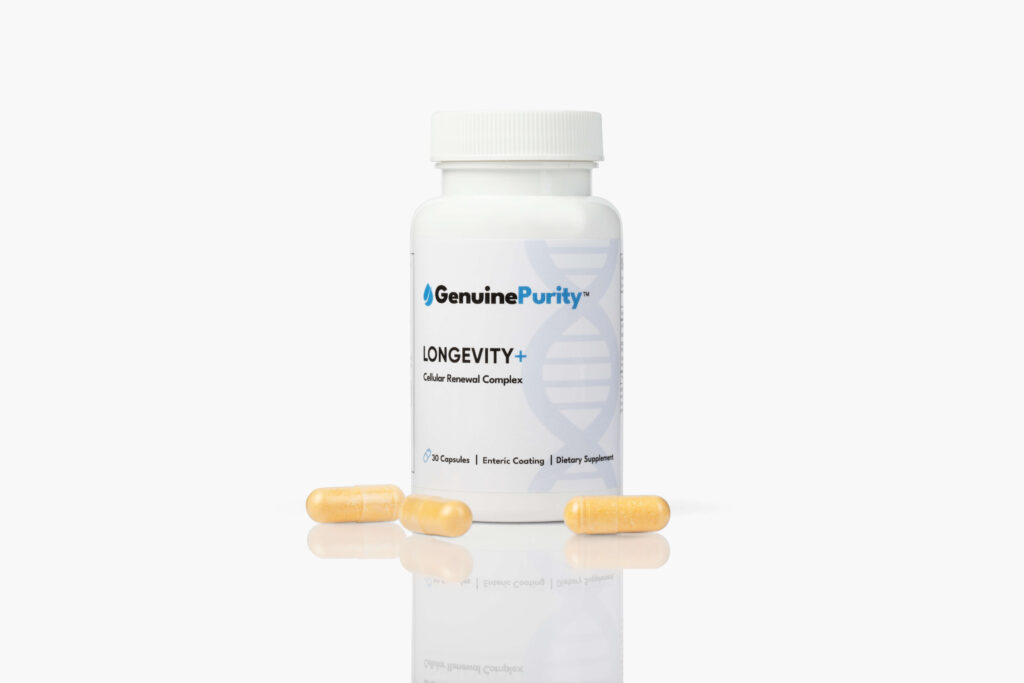Chances are, if you’re here, you already know the basics about telomeres – those protective caps at the ends of your DNA – and that their length is a key marker of cellular aging.
What’s more intriguing is how these tiny structures influence how long and how well we live. Telomeres are at the center of the longevity conversation for a good reason – they dictate the pace of cellular aging, keeping your genetic material intact as cells divide and renew.
Unfortunately, as they shorten, cells lose their ability to function optimally. While we can’t stop telomeres from shortening altogether, emerging research suggests we have more control over their preservation than previously thought.
Today, we explore the science behind and the promising future of telomere research while providing actionable strategies to protect them. The science is fascinating, but living with the energy, vitality, and resilience of someone half your age is empowering.
Understanding the factors that impact telomere health and taking proactive steps can extend your healthspan and optimize your quality of life. Because yes, you can influence the building blocks of your biological clock.
Let’s dive in.
Telomeres: The Key to Unlocking Longevity
Let’s dig deeper into what telomeres are doing for you. Think of them as the guardians of your genetic material. Every time a cell divides, telomeres keep the vital DNA coding intact, preventing errors or damage that could compromise cellular function.
Without telomeres, the replication process would quickly unravel – literally. What’s more, telomeres aren’t just passive protectors. They are a built-in biological clock, affecting everything from immune function to energy levels.
What makes telomeres fascinating is their role in aging and their potential as a healthspan marker. By maintaining telomere length, you aren’t just chasing immortality – you’re preserving vitality, slowing down cellular wear and tear, and giving yourself more time to thrive.
Next, we review how telomere shortening impacts cellular aging and age-related decline.
Telomere Shortening and Its Role in Aging
While you might know that telomeres shorten over time, called telomere attrition, you may not know what’s actually happening on a cellular level. In simplest terms, telomere shortening doesn’t just affect one cell – it has a ripple effect throughout your body.
Every time your cells divide, a small portion of your telomeres is lost due to the mechanics of DNA replication. This natural process leads to critically short telomeres, leaving your DNA vulnerable and signaling the cell to stop dividing or to self-destruct.
When cells stop dividing, they enter a state called senescence, where they no longer function efficiently. As a result, your body may slow down vital functions or, worse, stop them altogether.
Think of it this way: when telomeres become too short, cells enter a retirement phase where they stop pulling their weight. But senescent cells don’t just clock out and sit quietly; they stick around, causing inflammation, disrupting surrounding tissues, and accelerating the aging process.
The process of telomere shortening is influenced by more than just time. Let’s examine the factors that shape this process.
What Factors Influence Telomere Length?
Telomeres don’t shorten at a fixed rate. Their length is influenced by a combination of genetics, lifestyle choices, environmental factors, and even your state of mind.
Here’s a closer look at what can accelerate telomere shortening and speed up cellular aging:
- Diet: Diets low in antioxidants but high in processed foods deprive your cells of the nutrients they need to combat oxidative stress, a considerable driver of telomere shortening.
- Exercise: Regular movement, especially moderate-intensity aerobic exercise, can preserve telomere length, whereas excessive, high-intensity workouts can do the opposite.
- Stress: Chronic stress can accelerate telomere shortening by triggering the release of cortisol and other stress hormones, aging your cells faster than the clock.
- Sleep: Insufficient rest and poor sleep quality can negatively impact cellular repair mechanisms, contributing to quicker telomere degradation.
- Environmental Toxins: Exposure to smoking, pollutants, and other toxins can damage telomeres by ramping up oxidative stress.
- Genetics: Some people are born with a biological advantage – their starting telomere length is longer due to their inherited genetic blueprint.
- Epigenetics: Positive changes to your lifestyle and environmental factors that influence telomere maintenance can help counteract genetic predispositions.
The takeaway? Your genetics might set the stage, but your daily habits hold more power over your cellular health and telomere length than you might think.
Consistent exercise, balanced nutrition, and practices like mindfulness can slow telomere shortening and promote longevity.
Keep reading to learn how to support these tiny but mighty structures.
Strategies to Support Telomere Health
Telomere shortening may be inevitable, but emerging science shows us we can influence how quickly it happens.
Here are a few evidence-based strategies to protect and preserve your telomeres.
#1 Optimize Nutrition
Your diet has a direct impact on telomere health.
Here are some telomere-friendly foods to incorporate into your meals:
- Berries: Packed with antioxidants to combat oxidative stress.
- Leafy Greens: High in folate and vitamin C to support cellular repair.
- Fatty Fish: Rich in omega-3 fatty acids to slow telomere shortening.
Here are some things to limit or avoid when possible:
- Sugary Snacks
- Processed or Ultra-Processed Foods
- Trans Fats
These foods contribute to increased inflammation and oxidative stress. Approach your meal preparation as a tool for cellular preservation.
#2 Stay Active (But Don’t Overdo It)
Exercise is a double-edged sword for telomere health. While moderate, consistent physical activity can support telomere length, excessive high-intensity workouts can increase oxidative stress, accelerating telomere shortening.
Rather than harm your telomere length by overtraining, try to incorporate about 150 minutes of moderate aerobic activity, like brisk walking or cycling, per week. That’s just over 20 minutes each day.
#3 Minimize Stress
Telomere’s worst enemy is, you guessed it – chronic stress. Prolonged elevated cortisol levels put your cells into overdrive, accelerating telomere shortening. Prioritizing stress management with practices like yoga, deep breathing, or meditation can help reduce stress levels.
Mindfulness extends beyond reducing stress and improving our mental well-being; it also promotes telomere stability. Besides, a calm mind often means a healthier body overall.

#4 Cultivate a Positive Mindset
Your mental outlook can impact your physical health, positively or negatively, including your telomeres. Researchers have examined the link between optimism and positive psychological characteristics and telomere length.1,2
These findings across various studies suggest that surrounding yourself with supportive people, practicing gratitude, and focusing on what brings you joy may help preserve telomere length. After all, a happy mind fosters a healthier body.
#5 Supplement for Telomere Health
The anti-aging and longevity world is buzzing with natural telomere-supporting supplements.
Compounds like omega-3s, fatty acids, and polyphenols have shown promise for maintaining telomere length and supporting overall cellular health. Emerging supplements in the biohacking space like GenuinePurity Longevity+ contain these science-backed compounds, offering targeted telomere support.
Always opt for high-quality products from trustworthy brands when adding supplements to your routine. Approach supplementation with evidence-based practices and consult your healthcare professional if you are taking medication or have health concerns.
Remember, supplements should complement a healthy lifestyle, not replace it.
#6 Prioritize Quality Sleep
Poor sleep isn’t just exhausting; it’s aging your cells faster. Sleep is when your body repairs itself at the cellular level, and telomeres are no exception.
Allow your cells time to recover and regenerate by aiming to get consistent hours of quality sleep each night. Create a restful sleep environment, develop a bedtime routine to wind down, and minimize blue light exposure before bed to promote high-quality sleep.
#7 Limit Environmental Toxin Exposure
Smoking, chemical exposure, and pollution generate free radicals that can damage telomeres. While you may not be able to control every toxin in your environment, every small effort helps protect your cells from unnecessary stress.
Here are steps you can take to minimize exposure:
- Avoid smoking or secondhand smoke.
- Use air purifiers in your home and office.
- Opt for non-toxic household and personal care products.
Telomere health is more than just extending lifespan; it’s about optimizing healthspan. Making intentional lifestyle choices helps protect your telomeres and unlock a resilient future.
The Future of Telomere Science
Telomere research is evolving rapidly, with promising breakthroughs on the horizon for slowing telomere shortening and potentially reversing it.3 While we aren’t at the point of unlocking immortality, telomere science shows us that aging may be more malleable than we thought.
One area of focus is telomerase activation, the enzyme that can rebuild telomeres. While this process naturally occurs in some cells (i.e., stem cells), researchers are investigating safe ways to stimulate it more broadly to treat aging or degenerative diseases without triggering unwanted side effects.4
Emerging therapies undergoing research include gene editing technologies, like CRISPR-base editing5, and advanced nutraceuticals, like resveratrol and pterostilbene6, designed to optimize telomere health.
Research into the impact of lifestyle factors on telomere length underscores the importance of adopting a healthy lifestyle and managing positive risk factors to support telomere health.7
These findings could redefine how we approach aging, moving to proactive cellular preservation. The future is bright – and potentially much longer and healthier.

Telomeres Impact on Health and Aging is Monumental
Telomeres might be tiny – and their natural shortening process unavoidable – but science says we can give them the support they need. Choices you make today can shape a healthier, more vibrant tomorrow.
Eating nutrient-rich foods, staying physically active, managing stress, and prioritizing sleep can influence the pace of telomere shortening. Add a dose of mindfulness and smart supplementation with high-quality supplements like GenuinePurity Longevity+, and you’re on your way to promoting cellular resilience.
Endnotes
1. https://pubmed.ncbi.nlm.nih.gov/27616348/,
2. https://pubmed.ncbi.nlm.nih.gov/31688458/
3. https://pubmed.ncbi.nlm.nih.gov/38333665/
4. https://pubmed.ncbi.nlm.nih.gov/33001374/
5. https://pubmed.ncbi.nlm.nih.gov/38310618/



